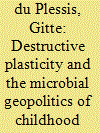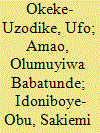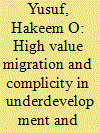|
|
|
Sort Order |
|
|
|
Items / Page
|
|
|
|
|
|
|
| Srl | Item |
| 1 |
ID:
193310


|
|
|
|
|
| Summary/Abstract |
Engaging Catherine Malabou's philosophical work on biological plasticity, this article combines microbiological and geopolitical analysis of the deadliest manifestations of childhood malnutrition. At the scale of microbiology, childhood malnutrition is a devastating condition and a mystery to which it seems microbiomes – the ecosystems of microbes in the gut – hold a key. At the scale of geopolitics, childhood malnutrition is a calamity generated by racial capitalism, poverty, and underdevelopment. What should we do with the plasticity that makes us? Malabou asks. Engaging philosophically with the plastic materiality of microbiomes in childhood malnutrition, the article focuses on destructive plasticity as an ontological alternative to what science on malnutrition pursues as a problem of causality. This leads to an argument that medicine, as well as humanitarian, security, and development interventions, must reckon with the destructive plasticity of what is in essence a political disease of annihilation. The article ends by speculating on resistance via the biological act of nurturing.
|
|
|
|
|
|
|
|
|
|
|
|
|
|
|
|
| 2 |
ID:
134342


|
|
|
|
|
| Summary/Abstract |
This article interrogates the continuing relevance of the contractarian governance paradigm to resource governance and the impact of exploitation on the local population and environment in the Democratic Republic of Congo (DRC), Zimbabwe and Ghana. It highlights the susceptibilities of their governance processes, particularly the roles of the elites of the host communities, the multinational corporations, and the governing authorities in appropriating resources for their personal interests, resulting in tensions and conflicts. This scenario is borne out of inept leadership, as well as the defective and compromised administrative mechanisms operational in these countries. In view of this, the article underscores the need for a ‘new governance management paradigm’ anchored on a communitarian framework, which incorporates all stakeholders, to guarantee sustainable peace and prosperity, particularly in conflict zones. The article therefore concludes that achieving a nexus between forestry, mining activities and economic development in these countries will require a restructuring of the existing governance mechanisms; and advocates for a new governance model capable of curbing the excesses of local and foreign hegemony, including a total overhaul of the seemingly compromised supervising authority.
|
|
|
|
|
|
|
|
|
|
|
|
|
|
|
|
| 3 |
ID:
116885


|
|
|
|
|
| Publication |
2012.
|
| Summary/Abstract |
Through a focus on the UK's 'High Value Migrants' programme, this article directs attention to how commercial migration laws and policies of developed countries could negatively affect the global South. Drawing mainly on insights from criminology and development studies, it investigates how the commercial migration laws and policies, specifically the aspects that deal with encouraging or attracting 'high-value' foreign entrepreneurs and investors, make the state potentially complicit in corruption and underdevelopment in the global South. There is an important need to address the implicated migration laws and policies as a critical and integral part of international efforts to combat corruption and promote peace and development in the global South. Reform of such laws and policies is in the long-term interest of all stakeholders.
|
|
|
|
|
|
|
|
|
|
|
|
|
|
|
|
|
|
|
|
|